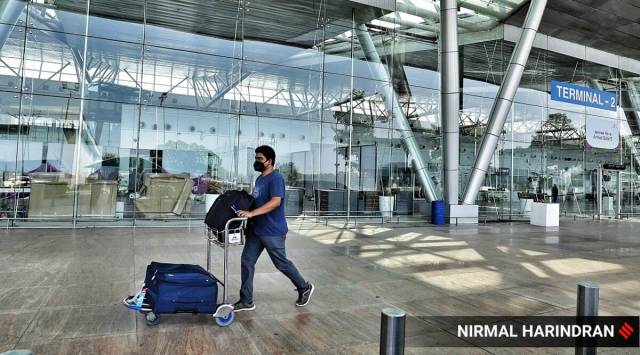- India
- International
No quarantine, testing at airport for international travellers starting Feb 14
Instead of mandatory quarantine, international travellers now have to monitor their health for a period of 14 days post arrival; Union Health Minister Mansukh Mandaviya said in a tweet that the demarcation of countries ‘at-risk’ and other countries has been removed
 Now, only 2% of the passengers selected at random will have to give their samples for testing (Express photo by Nirmal Harindran, Representational)
Now, only 2% of the passengers selected at random will have to give their samples for testing (Express photo by Nirmal Harindran, Representational)International travellers will no longer need to quarantine for seven days or get tested at the airport if they come from an at-risk country, according to the revised guidelines issued by the union health ministry on Thursday. With the omicron variant-driven wave subsiding in the country, the government has also done away with a repeat test on day 8 of arrival.
The new guidelines will come into effect February 14 onwards. At present, there are 141 districts in India where the positivity rate is over 10% and 160 districts where the positivity rate is between 5 and 10%. The country’s daily positivity rate – proportion of samples tested that return positive – has come down to 4.4% on February 10 as compared to 20.75 just two weeks ago on January 24.
All international travellers, irrespective of whether they had Covid-19 symptoms, were supposed to remain in quarantine for seven days, get tested on the eighth, and upload the report to the government’s Air Suvidha portal. Instead, now they have to monitor their health for a period of 14 days and report any Covid-19 like symptoms either to the nearest health facility or the government helpline 1075.
Those travelling from at-risk countries – a dynamic list of countries depending on their Covid-19 situation – had to not only submit a negative Covid-19 report from 72 hours prior to travel, they also needed to get tested on arrival and wait for the reports before leaving the airport.
Now, only 2% of the passengers selected at random will have to give their samples for testing. They will be allowed to leave the airport without waiting for the reports, according to the new guidelines.

“The demarcation of countries ‘at-risk’ & other countries removed. Accordingly need for giving samples on port of arrival & waiting till the result is obtained from countries ‘at-risk’ is dispensed with. Random sampling of 2% of International travellers from all countries on arrival. Travellers can give sample & are allowed to leave the airport,” said union health minister Mansukh Mandaviya in a tweet.
The @MoHFW_INDIA has issued revised guidelines for International Arrivals ✈️
Guidelines to come in effect from 14th February.
Follow these diligently, stay safe & strengthen India’s hands in the fight against #COVID19.
Main features include:
📖 https://t.co/J9e8ZJw3qw (1/6)
— Dr Mansukh Mandaviya (@mansukhmandviya) February 10, 2022
The new guidelines also make way for India allowing quarantine-free travel to those who are fully vaccinated with certificates from other countries. At present, this list includes 82 countries such as Australia, Bangladesh, Canada, Hong Kong, Malaysia, Nepal, Singapore that have an agreement with India on mutual recognition of certificates for vaccination using nationally recognised or WHO recognised vaccines. The vaccination certificates of travellers from countries that do not have an agreement but exempt fully vaccinated Indians from quarantine will also be accepted on the “basis of reciprocity”.
“Besides uploading negative RT-PCR report (taken 72 hrs prior to journey), option to upload certificate of completing full primary vaccination schedule of COVID-19 vaccination provided from countries on a reciprocal basis,” the health minister said.
All international travellers will still have to upload a self-declaration form with the history of travel in the last 14 days on the government’s Air Suvidha portal before travel and submit a negative RT-PCR test done 72 hours before travel. Only asymptomatic passengers will be allowed to board the plane, according to the new travel guidelines.
Apr 26: Latest News
- 011 day ago
- 021 day ago
- 0314 hours ago
- 041 day ago
- 051 day ago








































